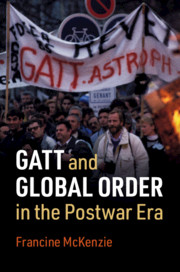(Source: CUP)
Cambridge University Press is publishing a new book on the Post-WWII trading system and its role in foreign policy and international relations.
ABOUT THE BOOK
After the Second World War, the General Agreement on Tariffs and Trade (GATT) promoted trade liberalization to help make the world prosperous and peaceful. Francine McKenzie uses case studies of the Cold War, the creation of the EEC and other regional trade agreements, development, and agriculture, to show that trade is a primary goal of foreign policy, a dominant (and divisive) aspect of international relations, and a vital component of global order. She unpacks the many ways in which trade was politicised, and the layers of meaning associated with trade; trade policies, as well as disputes about trade, communicated ideas, hopes and fears that were linked to larger questions of identity, sovereignty, and status. This study reveals how the economic and political dimensions of foreign policy and international engagement intersected, showing that trade was not only instrumentalised in the service of particular policies or relations but that it was also an essential aspect of international relations.
ABOUT THE AUTHOR
Francine McKenzie, University of Western Ontario
Francine McKenzie is a Professor at the University of Western Ontario. She is an international historian who has published extensively on international cooperation, trade, and global order. Her publications include Redefining the Bonds of Commonwealth, 1939-1948 (2002), A Global History of Trade and Conflict since 1500 (2013) and Dominion of Race: Rethinking Canada's International History (2017).
TABLE OF CONTENTS
Introduction: GATT in World Affairs
1. Accidental Organization: Origins and Early Years of GATT
2. 'An Arrow in the Western World's Quiver': The Cold War Challenge to GATT
3. 'Take It or Leave It': The EEC Challenge to GATT
4. 'Spread Like the Plague': The Regional Challenge to GATT
5. 'Rich Man's Club': The Development Challenge to GATT
6. 'Agricultural Anarchy': The Agriculture Challenge to GATT
Conclusion: The Embattled History of GATT.
1. Accidental Organization: Origins and Early Years of GATT
2. 'An Arrow in the Western World's Quiver': The Cold War Challenge to GATT
3. 'Take It or Leave It': The EEC Challenge to GATT
4. 'Spread Like the Plague': The Regional Challenge to GATT
5. 'Rich Man's Club': The Development Challenge to GATT
6. 'Agricultural Anarchy': The Agriculture Challenge to GATT
Conclusion: The Embattled History of GATT.

